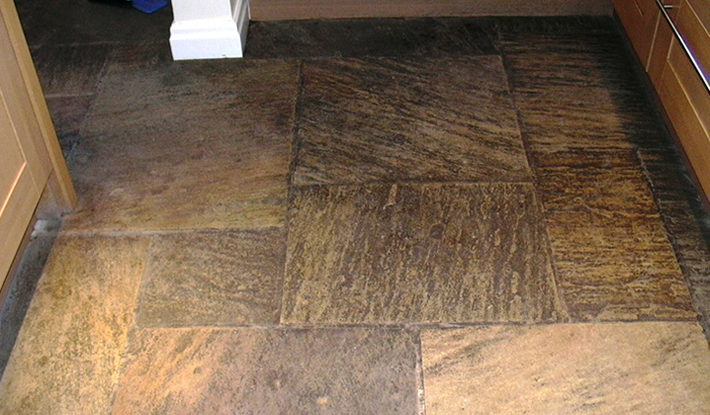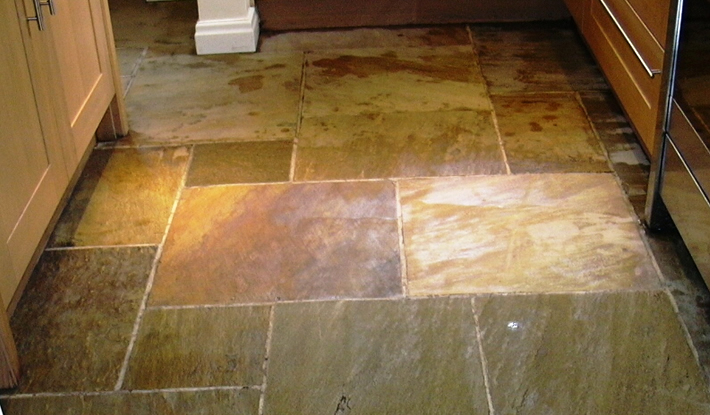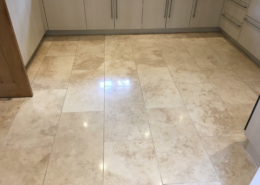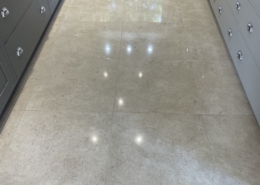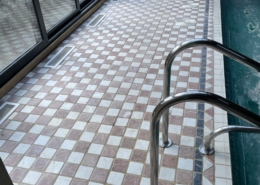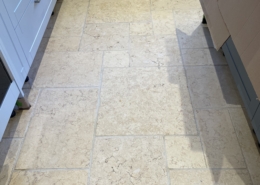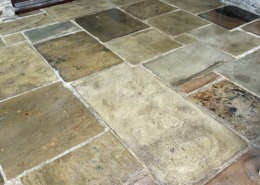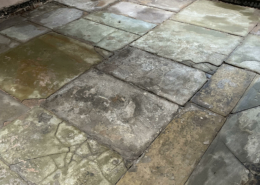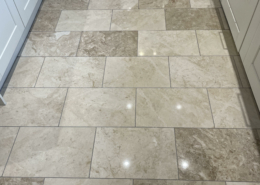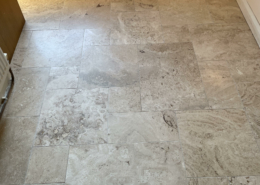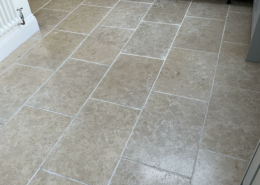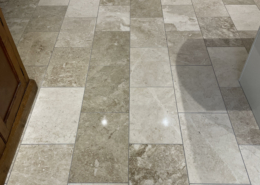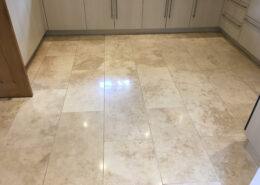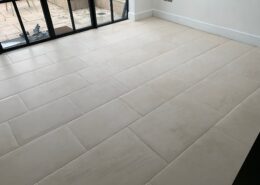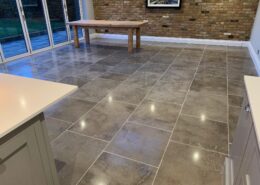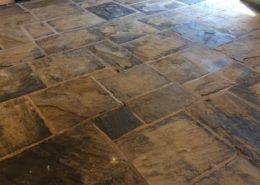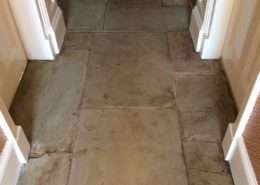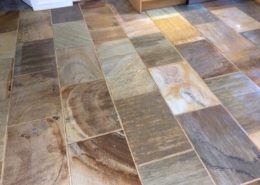Stone floor cleaning, sealing and restoration
We specialise in caring for for all types of natural stone floor, so that you can enjoy this beautiful, long lasting natural material.
Natural stone floor types
We work on many different types of natural stone that have been put to use in a wide range of floors. The advantages and vulnerabilities of each type of stone are drastically different, but our experience, equipment and dedication ensures that we get the best possible result for you. Natural stone floors are an investment worth protecting and we can help you get the most out of that investment.
Common issues
While each type of stone will have its strengths and issues, the best solution for your floor will depend on your unique situation. All stone floors undergo general wear and tear to some extent. The most common form of damage that we see is simply from dust, dirt and grit being trodden into the floor. This can be minimised with regular, careful dusting and vacuum cleaning, but it is unlikely that you will be able to eliminate it completely. This is even more noticeable on hard floors that are polished to a high sheen, the minute scratches in the surface dull the effect.
In some cases, where the rock is more porous or the sealant has completely worn away, we find damage from water and other liquids. The level of acidity commonly found in food and drinks leaves long lasting stains on certain types of stone and the use of cleaning products and solutions should always carefully take this into account.
One common feature of tiled floors is grout. This softer substance found between the tiles is often more vulnerable than the tiles themselves. Being somewhat recessed, the grout can act as a trap that catches dirt, and its more porous surface can become stained and discoloured.
How we maintain natural stone floors
The exact process we use will always vary according to the type of stone, the condition of the floor and the finish that you would like to achieve. Here is an example, based on how we often work:
- Tile and Stone Medic will analyse the floor type that you have before we decide on the appropriate solutions that should be used.
- The solution is then left to dwell for a short period of time.
- Once the relevant solutions are applied to the floor, they are worked into the surface using rotary cleaners.
- Once the dwell time has been achieved, the floor is then washed with our powerful fresh water extractor systems to ensure that all old sealers, dirt and other contaminants are removed from the tile or stone surface.
- The surface is washed over a few times to ensure that the floor is completely neutralised and free of any soiling.
- Once the floor is dry the appropriated sealers are applied, the sealers range from impregnating sealers which will not affect the look of the tile or stone, to matt, satin or high solid gloss finishes.
Tile and Stone Medic will give you advice on the most appropriate sealer to use for maximum effect on your tile or stone floor. Advice on cost effective maintenance programmes and products to enhance and maximise your tile or stone floor’s life are available on request.
Examples of our work
FAQs
The process we carry out will depend on your specific floor and the use that it gets. There will be variations for different materials and the finish that you wish to achieve. The process will also be impacted by the full scale of work that we carry out, for example which types of cleaning and restoration are being performed. It is not unusual to apply several layers of sealant if this is necessary and appropriate.
Firstly, a floor should always be sealed when it is first laid. Get in touch with us straight away if this hasn’t been carried out already. It will also need periodic sealing in order to protect the floor on an ongoing basis. How often sealing is required depends on a number of factors such as the specific material used for your flooring and the kind of use it has to survive. For example, a bathroom with natural tiles that is frequently exposed to water may require sealing more often than porcelain tiles in a kitchen. Frequent maintenance, such as sweeping and hoovering up the dust and grit that erodes floors when trodden on can help. Once the sealant is worn away, not only will scratches be more likely, the risk of staining or permanent damage from liquids is drastically increased as there is no protective layer to prevent absorption. If in doubt get in touch with our team of friendly technicians who can discuss your needs.
We have a range of high quality Faber products which will help protect your floors from damage. As every type of floor is different and has myriad uses, we will consult with you to work out the best way to protect your investment. We can apply topical sealants which form a protective layer on top of the floor, or if needed an impregnating sealant, which will be partially absorbed into the stone or tiles. There are many variations of these sealants and as each floor type has unique characteristics and vulnerabilities we can work with you to find and apply the the best kind of protection.
Absolutely. If this was not carried out by those who fitted the floor get in touch immediately to ensure that the appropriate protection can be applied as promptly as possible. We would recommend that this is carried out once the flooring is in place as this means the grout, which is generally more porous, will also be protected.
We apply a sealer to a floor in order to protect it. Different types of floor, both manmade and natural stone, are vulnerable to different sorts of damage. They can all be harmed by chemicals to a certain degree, even by the acid in food and drink spillages, as they will be very slightly porous. As well as this, they can be worn away by physical damage. Even foot traffic can have a big impact if dust or grit has built up on the floor, since it increases abrasions. A sealant will reduce the chance of a spill becoming a stain by reducing the floor’s ability to absorb liquids. It can also help protect the appearance of the floor by forming a protective barrier. A sealant won’t prevent all damage and it will still wear away over time, but it will help your floors last longer, helping protect your investment. Sealants will even help protect your floor from UV radiation which can lead to fading over the lifespan of a high value stone or tiled floor. We can consult with you to find the best sealant for your floor and the type of use it gets to make sure it receives the best form of protection.
We are happy offer advice on best practice to look after your flooring, but it depends on the type of floor you have. Once we’ve had a look at it we’ll be able to help.
Yes, we have a range of fillers we can use to repair chipped or dented stone. Please note we can only carry out floor repairs as part of a full deep clean or restoration for your stone floor. Unfortunately, we are not able to attend to carry out repairs in isolation.
Usually we are able to stabilise stone flooring where it has become loose. We can repair grouting and make spot repairs to the subfloor where necessary. Please note we can only carry out floor repairs as part of a full deep clean or restoration for your stone floor. Unfortunately, we are not able to attend to carry out repairs in isolation.
Almost certainly. Send us a picture or a description and we’ll identify your stone. We always assess a surface before work starts in order to pick the most appropriate solution.
Whilst we may use specialist chemicals in the course of our work, we can assure you that by the time we leave all residues will be gone and your tile or stone flooring will be perfectly safe for everyone to use. We work to extremely high standards of health and safety, conducting proper risk assessments where appropriate and never putting you or anyone else in danger.
We always work in the most considerate way possible. Work will be tailored to your needs and will fit around your schedule where possible. We avoid bringing loud or bulky machinery into your home and when a job is complete we thoroughly clean up after ourselves to leave your space looking as tidy as it did when we arrived.

